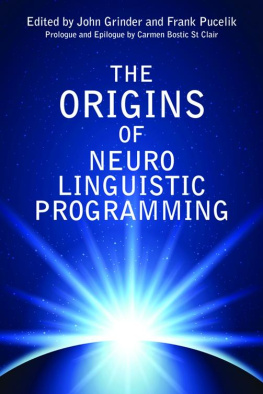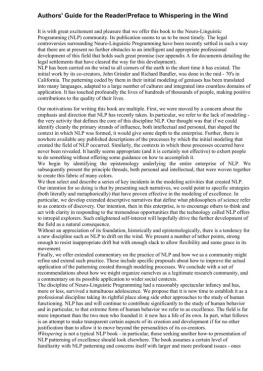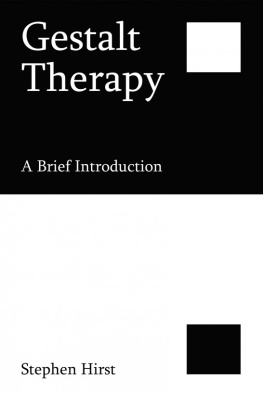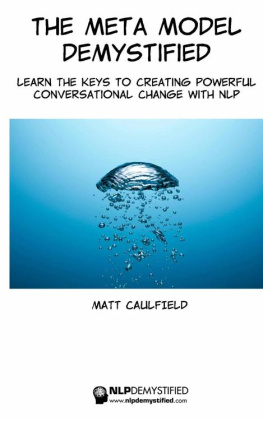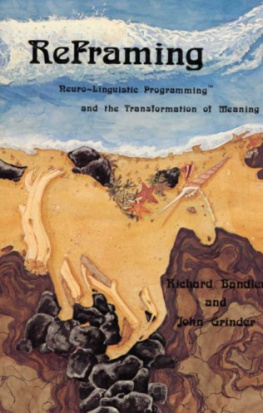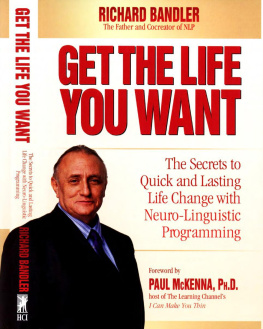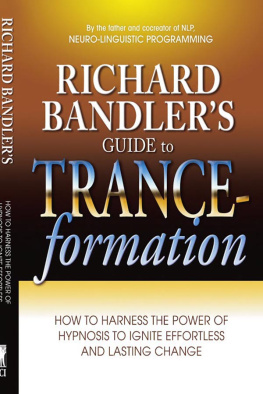Finally! Forty-two years later the true origins of NLP are revealed which up to now have only been the subject of mystery and legend. This is a must-read book for any student of NLP. In it we learn what actually happened during the first nine years of NLP and which set the stage for everything that has followed.
Today everyone claims to be one of the developers of NLP. Now we learn who the real developers actually were. Further, we are reminded that the Meta Model is the genuine heart of NLP and that it can only be mastered through ongoing practice. We learn that there were three and not two creators of NLP and are introduced to Frank Pucelik, who tragically many people in NLP have never heard of. Frank lives in Odessa in the Ukraine and continues to pioneer developments in NLP for business and works with at-risk young people.
John Grinder makes several points that the NLP world today desperately needs to hear and apply. He warns of the danger of content, categories, and pre-mature labeling and redirects us to focus on process. He also emphasizes the power of patterning, modeling, and testing in the creation of new applications.
In short, devour this book, imitate the same rigorous methods that were used by the developers, and bring this rigor to develop the next generation of NLP.
Wyatt L. Woodsmall, PhD,
NLP Master Trainer and Master Modeler
Different voices, different histories this multiplicity of sometimes conflicting perspectives is a salutary reminder that, as NLP has been at pains to point out, we each have our own map. Or as Robin Williams once said, Reality what a concept!
Ian McDermott, founder of International Teaching Seminars
This is a big important book for the distinct and radical field of NLP, its trainers, practitioners, and critics. With contributions from a core of the original developers from the 1970s, here is an inspiring, sometimes contradictory, multilayered account of the cultural and intellectual background, the key colorful characters, the playful collaborations, the role of artistry and the creative unconscious, the adventures in modeling, research, and rigorous testing as well as some fine examples of early successful NLP applications.
This book sets the scene for the real questions being posed: What really is NLP? Where is it going? Is it now merely a set of techniques you can learn by rote in a few days? Or does NLP still offer a subtle, skills-based, and fundamental opportunity to further expand and deepen our knowledge and practice of the arts of human communication, learning, and change?
The Origins of Neuro-Linguistic Programming is an exceptional and essential read for everyone involved in NLP and interested in contributing to its future.
Judith Lowe, MD and Principal Trainer of
NLP Training Institute/PPD Learning Ltd
Thank you John Grinder and Frank Pucelik for your work in providing us with an account of how neuro-linguistic programming began as a seed and grew rapidly during the 1970s. NLP is now in its fifth decade and for the first time we have a reliable book that offers a history of NLP.
The Origins of Neuro-Linguistic Programming is both a story and collection of stories. The theme of the main narrative is the creation of NLP; the collection of stories is a rich anthology from the people who were there at the beginning and others who came along after the foundation was in place. The accounts in this book capture the commitment of Grinder, Bandler, and Pucelik as well as the spirited people they attracted to radically experiment with patterns of human excellence.
What makes this book exciting are the multiple voices narrating their personal experience of NLP during the heady days of 1970s. However, there is much more than history in these pages. If you focus at a deeper level you will find something very rich which is often missing in modern NLP the fearlessness, the radicalism, the desire to experiment, the commitment to model, and the willingness to undertake thousands of hours of practice. Without these elements we would not have NLP today. As you read and enjoy the voices from these pages, you may want to consider how NLP would be more colorful in the current age if we embraced the attitude of the individuals who gave us so much in inspiring and creating the field of neuro-linguistic programming.
Michael Carroll, founder of the NLP Academy and
co-founder of the International Trainers Academy of NLP
An enjoyable, exciting, and informative adventure through the brilliant and quirky origins of NLP. This book is a hymn to the spirit of curiosity, creativity, collaboration, and adventure.
Julian Russell, Executive Coach and
Director of The Life Talent Programme
We have been waiting almost 40 years for this book a first-hand account by some of the people who were there at the beginning at one of the most creative times in history. The Origins of Neuro-Linguistic Programming can be enjoyed as several interwoven narratives, and you can model the modelers for their process of discovery, testing, trial, and feedback. Whichever filter you choose, this engaging book will provide more about the original spirit of NLP.
James Lawley and Penny Tompkins, authors of
Metaphors in Mind: Transformation through Symbolic Modelling
To Richard Bandler
Your voice is not here, only echoes of it. Your intelligence, your fearlessness, and your presence are apparent in many of the narratives. We formed a team, the three of us, then the two of us, and against all odds, we succeeded in creating something distinct and radical and set it free in the world.
It was a great adventure!
John Grinder
Frank Pucelik
Contents
Carmen Bostic-St. Clair
Welcome to the process of discovery. This book is a step back in time, composed of a series of articles written today, some 40 years later, by individuals who came together in Santa Cruz, California during the years 19711979.
A time when the Dow Jones Industrial Average was still under 1000 points, a new car cost less than $4,000, and the kidnappers of Patricia Hearst were demanding $70 of food be given to every needy Californian. The time is 1970s, an era of change and protest. Bob Marleys song, I Shot the Sheriff, along with songs by Paul McCartney and the Rolling Stones, could be heard blasting from the radios of brightly decorated VW vans; Jesus Christ Superstar was playing at the single screen cinema crowded with long-haired men and women wearing fringes, bell bottoms, and fatigue boots smells of clove, tobacco, and other substances filled the turbulent air.
We ask you to enjoy the process of experiencing the discoveries as they unfold in the vivid and animated descriptions by some of the individuals who have written articles for this book; as you enjoy, we ask you to engage in a process that is congruent and consistent with the experiential teaching practices which were utilized by Richard Bandler, Frank Pucelik, and John Grinder during trainings on or near the University of California at Santa Cruz.
Words on paper do not really capture the full impact of a brief moment in time, so we are suggesting as you read that you utilize some of the well-known original processes of the field. We ask you to set the stage to set your computer, television, or whatever device on which you listen to music and tune it to the sounds of the 70s. While enveloped by these sounds, we invite you to transport yourself to the campus as described through the eyes of the writers; to gaze through the redwood forests and capture glints of the shimmering Pacific Ocean melding with the horizon; while you are observing the gentle movement of the deer, listen for the call of the red tail hawk as you briskly rub your arms to ease the chill and become aware that the cool breeze carries the fresh scent and taste of salt. You have arrived at the campus step lightly into the shoes of these young, eager individuals as the adventure unfolds.

